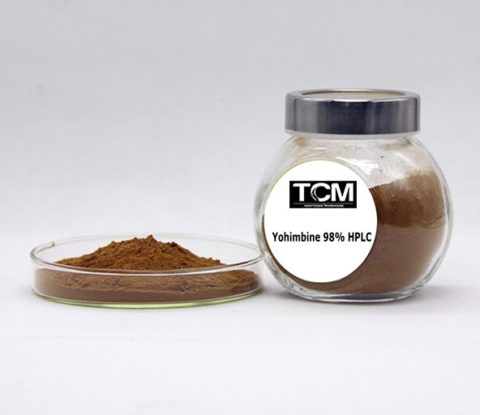
Yohimbine 98% HPLC
Yohimbe Bark Extract
【Botanical Source】: Pausinystalia yohimbe
【Active ingredient】: yohimbine/yohimbine hydrochloride/ yohimbine HCL
【Spec.】: 8%,98% HPLC
【Molecular Formula】: C21H26N2O3 • HCl
【Molecular Weight】: 390.9
【CAS Number】: 65-19-0
【Melting Point】: 288-290 °C
【Color】: Reddish brown(8%), white crystalline(98%)
【Particle size】: 95% pass 80 mesh size
Brief Introduction
Yohimbine is found naturally occurring primarily as an alkaloid in the Pausinystalia yohimbe tree (sometimes referred to as Corynanthe yohimbe), and can be found in the plant known as Rauwolfia Serpentina, as well as the Rauwolfia family of plants in general. Yohimbine, as a molecule, is sometimes also referred to as aphordine, corynine, hydroaergotocin, and quebrachine.
Yohimbe, and its subset yohimbine, are fat-burning compounds, primarily used to lose fat during short term fasting. Yohimbine is also an aphrodisiac and can aid erectile dysfunction. It is also a general stimulant. Yohimbine works by increasing adrenaline levels in the body, as well as inhibiting a regulatory process in fat cells, which normally suppresses fat burning.
Yohimbine Benefits
1. Sexual dysfunction
Yohimbine, secondary to its alpha-2-adrenergic inhibitory potential, was commonly used as first-line treatment for erectile dysfunction previous to the advent of PDE5 inhibitors(Shamloul R Natural aphrodisiacs . J Sex Med. (2010)). A review that cited the following trials(Mann K, et al Effects of yohimbine on sexual experiences and nocturnal penile tumescence and rigidity in erectile dysfunction . Arch Sex Behav. (1996)) notes a variable efficacy range of 34-73% exists and this may be due to efficacy in persons with psychogenic erectile dysfunction rather than other models of erectile dysfunction, such as organic.
Combination therapy of Yohimbine with L-Arginine has shown preliminary benefits with more efficacy in mild to moderate (rather than severe) erectile dysfunction(Kernohan AF, et al An oral yohimbine/L-arginine combination (NMI 861) for the treatment of male erectile dysfunction: a pharmacokinetic, pharmacodynamic and interaction study with intravenous nitroglycerine in healthy male subjects . Br J Clin Pharmacol. (2005)).
Important safety information:
1. Yohimbine may cause dizziness. Do not drive, operate machinery, or do anything else that could be dangerous until you know how you react to yohimbine. Using yohimbine alone, with certain other medicines, or with alcohol may lessen your ability to drive or perform other potentially dangerous tasks.
2. Use yohimbine with extreme caution in the ELDERLY because they may be more sensitive to its effects.
3. Yohimbine is not recommended for use in CHILDREN. Safety and effectiveness have not been confirmed.
4. PREGNANCY and BREAST-FEEDING: Yohimbine is generally not recommended for use in women. Do not use yohimbine if you are pregnant. If you suspect that you could be pregnant, contact your doctor immediately. It is unknown if yohimbine is excreted in breast milk. Do not breast-feed while taking yohimbine.
Possible side effects of yohimbine:
All medicines may cause side effects, but many people have no, or minor, side effects. Check with your doctor if any of these most COMMON side effects persist or become bothersome: Dizziness; flushing; headache; nausea; nervousness.
Seek medical attention right away if any of these SEVERE side effects occur:
Severe allergic reactions (rash; hives; itching; difficulty breathing; tightness in the chest; swelling of the mouth, face, lips, or tongue); agitation; decreased or painful urination; fast heartbeat; hallucinations; irritability; panic attacks; restlessness; severe headache; sweating; tremors; vomiting.
This is not a complete list of all side effects that may occur. If you have questions about side effects, contact your health care provider. Call your doctor for medical advice about side effects.
2. Yohimbine and Weight Loss(http://www.bodybuilding.com/fun/issa33.htm)
Kucio and coworkers conducted research looking for answers to this very question. In their research report, titled, “Does yohimbine act as a slimming drug?” they found an interesting answer. In this study, twenty female subjects were first subject to a 3 week 1,000 Calorie per day diet. After this 3 week period, 10 subjects were given yohimbine and the other 10 were given a placebo for three additional weeks, in addition to the 1000 Calorie per day diet.
They found that the yohimbine treatment significantly increased weight loss; 3.55 kilograms body weight lost in the yohimbe group versus 2.21 kilograms body weight lost in the placebo group. However, there was not a significant effect on lipolysis observed, nor did treatment with yohimbine delay the gastric emptying rate. Keep in mind that while over two pounds more weight was lost by the yohimbine taking group, there were no measurements of where the weight was lost, body fat or muscle, and that these results were observed in sedentary females, eating 1000 Calories per day.
Also, there are other nutritional aids that can result in greater weight loss, with fewer or no side effects. The researchers concluded that further research is warranted to determine the applicability of using alpha 2-receptor inhibitory supplements as supplementary management in the treatment of obesity.
Waluga and coworkers went on to examine what the combined effects of caffeine and yohimbine were on cardiovascular function and rate of weight loss. To do this they divided twenty-seven healthy women, into three groups of 9. The first group received only a very low calorie diet (400 Calories per day) and a placebo. The second group received the same diet, and caffeine supplement treatment. The third group received the same diet, and caffeine treatment used in group 2, plus yohimbine.
The treatment lasted for 10 days. At the end of the study the researchers observed a significant reduction in body mass in all groups, with no statistical difference between the groups; Group 1 lost 3.3 kilograms of body weight, group 2 lost 3.5 kilograms of body weight, and group 3 lost 3.4 kilograms of body weight. Although no significant results were seen between the groups, the researchers pointed out that this study was only 10 days long, and that the subjects were on a very low calorie diet, which may have distorted any weight loss effects of the supplements, or was too short to distinguish the real effects reported by other researchers.
However, the main aim of the study was to determine adverse effects of the supplement treatment on the cardiovascular system, and in fact, the researchers did determine that the inclusion of yohimbine along with the caffeine, did evoke some potentially dangerous changes in the cardiovascular system. They concluded that the addition of yohimbine should be treated with caution, and must be excluded in particular obese individuals with cardiovascular complications.




